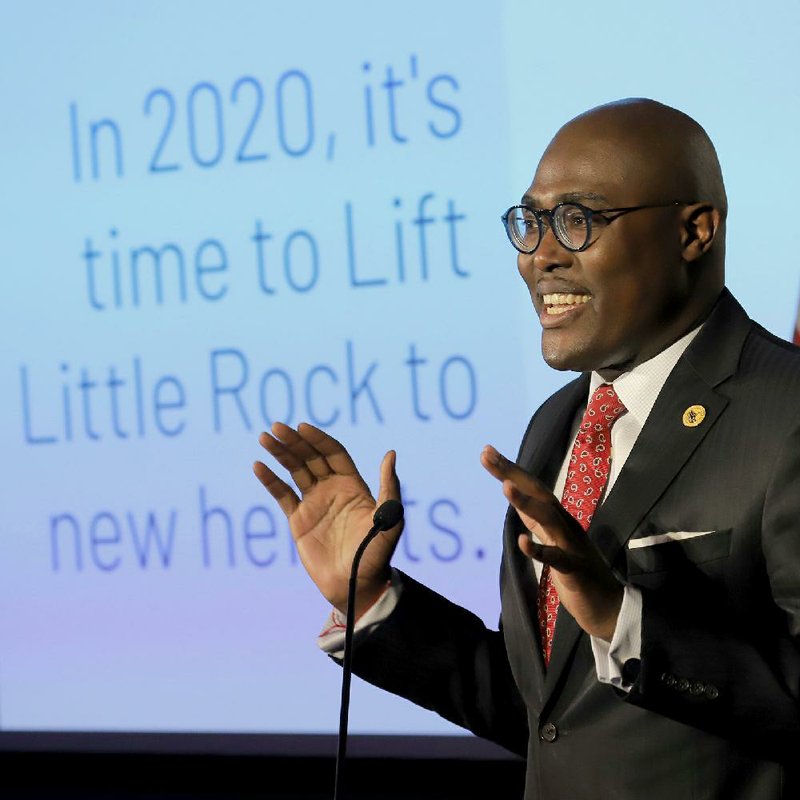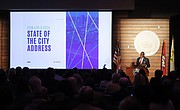Mayor Frank Scott Jr. is asking Little Rock voters for a new 1% city sales tax he will campaign for in 2020.
Scott touted strides the city made during his first year in office but said during his State of the City address Thursday evening that investment from residents was needed to accomplish more bold ideas.
"We have worked and continue to work tirelessly to improve our city, but we need your help," Scott told those watching the speech at Heifer Village in downtown Little Rock or online via livestream. "Without dedicated funding and intentional effort to lift our city beyond status quo, we cannot reach our full potential."
The additional 1% would generate approximately $50 million annually for "specific quality of life initiatives," the mayor said. It would fund new recreation facilities at the city's parks and an expansion and new exhibits at the zoo, implementing recommendations from two task forces that studied the projects last year.
Increased revenue from a sales tax also would go toward universal early childhood education, completing ongoing infrastructure projects and an economic development fund to recruit new businesses, Scott said.
A presentation slide included a logo of the phrase "Lift Little Rock," with an upward green arrow in place of the first "i."
Little Rock's overall sales tax rate is currently 9%, with 6.5% going to the state, 1.5% going to the city, and 1% going to the county.
[Video not showing up above? Click here to watch » https://www.arkansasonline.com/131city/]
Scott said the proposed sales tax increase would align Little Rock with its neighbors and with other cities in the South. He cited Birmingham, Ala., which has an overall sales tax rate of 10%, of which the city takes 4%. Lonoke has an overall rate of 10.5%, while Searcy, Fayetteville and Springdale have overall rates of 9.75%, he said.
North Little Rock increased its city sales tax rate from 1% to 2% in 2018, meaning consumers in that city pay an overall sales tax of 9.5%.
Charles Blake, the mayor's chief of staff, said the administration hopes to put the question to voters before the fall. Blake said the the mayor's team plans to first engage the community and ask voters how they would want the money to be spent.
"We want the people to tell us what they want," he said.
For the sales tax proposal to be put on the ballot, the Little Rock Board of Directors must first pass an ordinance allowing the question to be put to voters, City Attorney Tom Carpenter said.
Carpenter said it's often helpful for sales tax proposals to use general language to account for changes over time. For instance, if a tax is in effect for a decade, the city isn't bound to spending money on outdated technology.
"Saying 'operations and capital' gives you flexibility," Carpenter said.
A midyear budget amendment closed the golf courses at Little Rock's War Memorial and Hindman parks, and Scott put a task force in charge of developing new ideas for the areas. Scott said those recommendations, which include an indoor sports complex and soccer fields at War Memorial park, would be implemented with the new tax.
A separate task force recommended an expansion of the zoo into War Memorial Park along Fair Park Boulevard, with new features that would include a giraffe feeding deck, a new bear habitat and habitats for red wolves and razorback hogs.
Red wolves serve as a mascot for Arkansas State University in Jonesboro, and razorbacks serve as the mascot for the University of Arkansas, Fayetteville.
Scott also said funding could be used for a new senior center, improvements to Rebsamen Tennis Center and Jim Dailey Fitness and Aquatic Center, and a pool at the West Central Community Center.
"A chicken in every pot and a pool too, evidently," Ward 5 City Director Lance Hines said after the speech. "I don't know. It's a lot."
Hines said city directors hadn't been briefed on Scott's proposals before the address.
Ward 3 City Director Kathy Webb said she was "excited about the things we could do with the extra penny," especially about Scott's proposals relating to education.
Scott also said he wanted to extend a plan to turn schools in underserved neighborhoods in the Little Rock School District into "community schools" that offer wraparound services to the entire district.
Scott said he plans to release a "2030 Plan" by March 31, which will deal with long-term, strategic planning for the city. Some new initiatives are already underway.
In October, a mayoral task force told the city board that Little Rock should keep its hybrid form of government while giving the mayor more power, reducing the size of the board and replacing at-large board seats with regional ones. Scott said he would today send two ordinances relating to Little Rock's form of government to the city board for consideration.
The city is currently accepting applications for its first chief equity officer, who will oversee diversity and multicultural initiatives and create a diverse vendor purchasing plan for Little Rock's women and minority businesses, Scott said.
His goal is to increase the city's discretionary spending with women and minority businesses to at least 25% over the next three to five years.
This year, he plans to revitalize the Mayor's Youth Council by having participants get involved in this year's census and register new voters. Scott said he also plans to engage residents in the #ExploreLR social media challenge to encourage people to visit places in the city they wouldn't normally go.
A Section on 01/31/2020


